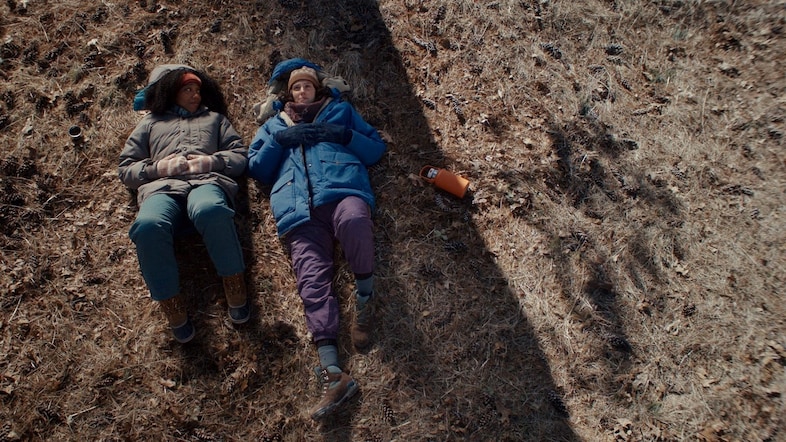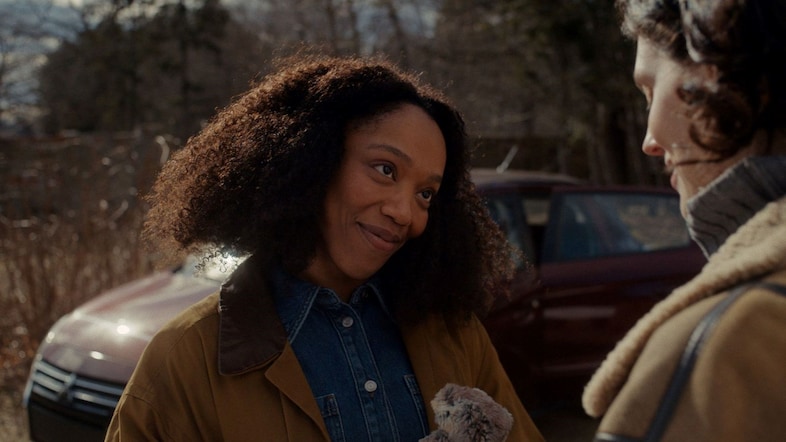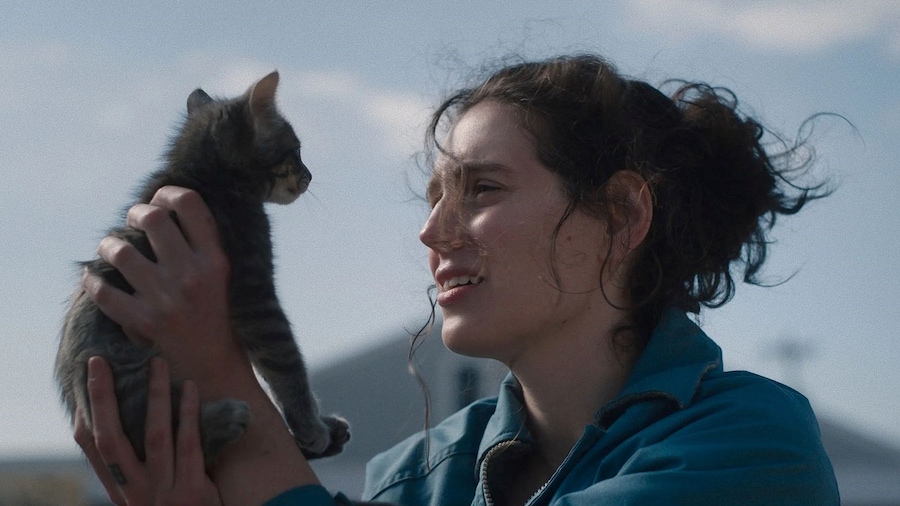Out in UK cinemas now, Eva Victor’s breakout film is a tender-hearted and fragile expression of hope for the future
The opening shot of Sorry, Baby – Eva Victor’s tender-hearted debut feature about the aftermath of trauma – is of a house in the woods at night, windows aglow. Somewhere in New England, this is the student home where drifting young professor Agnes (Victor) has lived with her cat, Olga, for half a decade since graduating. The director explains that the shot was a nod to Kate Winslet’s cottage in The Holiday, a setting which “can be very romantic”, but “also skew more horror”.
The biggest breakout at this year’s Sundance Film Festival, Sorry, Baby masterfully walks this tonal tightrope. It’s divided into three chapters, beginning with “The Year With the Baby”, in which best-friend Lydie (Naomi Ackie, showing off her criminally underused funny side) punctures Agnes’s blue bubble of isolation with the yellow beam of her car headlights. She also comes bearing news that she is pregnant, and, as their old classmates gloat about their promotions, new digs or engagements at a reunion, this stirs up uncomfortable emotions for Agnes, who has been stuck in stagnation.
Gesturing to the reason behind Agnes’s slump, the opening shot has an ominous double meaning. In the flashback “The Year With the Bad Thing”, we are introduced to Agnes and Lydie’s wide-eyed student selves. Lydie is at the start of a learning curve with her queer identity, while Agnes is prime scholar material – and her teacher’s (Louis Cancelmi) favourite. Visiting his house one night to get notes on her dissertation, he assaults her – an event kept defiantly off-camera as cinematographer Mia Cioffi Henry trains her lens on the exterior of his house, day gradually turning into night.
A refreshing departure from the rote sensationalisation of most trauma narratives, it’s a narrative choice informed by a conscious decision to avoid anything that could be triggering. “I wanted the film to feel like it was hugging you while watching it,” says Victor. “I really wanted to make a film for the person that I used to be.”
For the comedian and former Reductress writer (who gifted the internet the “straight pride” video and such headlines as “How to Fuck So Hard You Never Want to Fuck Again and Are Finally Free”), the script was the product of an intensely introspective period during lockdown, staying at a friend’s house in Maine.

The resulting film – as its title might suggest – is a sensitive and smart cinematic equivalent of a comfort blanket, cradling viewers on Agnes’s winding, non-chronological path to healing. Detours include accidental cat adoptions, mouth-watering subs and a situationship with Agnes’s gentle neighbour (Lucas Hedges). Visually, Victor adopts a low-key, Kelly Reichardtian style replete with luxuriously lingering static shots: “Sometimes we stay wide for a long time and it doesn’t sacrifice interiority. In fact, you feel closer to [characters] when you feel their loneliness from afar.”
Many have rushed to cite the film in a post-#MeToo context, but Agnes’s story seems harder to define. In one scene, when the academic is called to jury duty and is filling out a form, she refuses to tick the male or female box. Part of Agnes’s experience, says Victor (who uses they/she pronouns), is the collapse of “rules” that are “supposed to make her feel safe”: “We’re taught that our body is our body. We’re taught there are boys and there are girls. This kind of experience is so devastating, and it also feels like you see the matrix.” Emily Costantino’s steadily more androgynous costuming was a way of charting Agnes’s shifting gender expression.
Against these themes of loss of autonomy, catharsis for Victor was found not only in the act of writing but directing, and “this whole group of people saying, ‘Your word about where you want this person’s body to go is valuable’”. As an aside, they add: “I’m glad that the costumes looked gay enough.”

Victor also relished writing “two different versions of queerness”, culminating in a standoff between Lydie’s partner (ER Fightmaster, “a super-evolved trans person”) and the awkward young professor. “There was a lot of joy in getting to put Lydie’s partner next to Agnes and make Agnes have this internal experience of, ‘Whoa, that’s who I was meant to be,’” says Victor.
Ultimately, Sorry, Baby is anchored by the two friends’ alchemical connection, Ackie’s laidback character essentially being the film’s “romantic lead”. Acting alongside cats and babies, conversely, was no easy feat for a first-time filmmaker. Olga is played by two rescue cats, Evan and BB, surrounded by protective barricades at all times: “It was a little bit of a diva lifestyle for them, I have to say. Every other shot they got switched out.” However, the animals and infants were “some of the most honest performers in the film”, giving Agnes the crucial push to get back on her feet and find a way forward, in whatever form that may take. “I don’t know what Agnes’s future is like,” muses Victor. “I don’t know if she becomes a mother. I don’t know if she writes. I don’t know – but I do know that she, in the moment with the baby, feels quite useful. Anything that happens later, that’s not my business.”
Sorry, Baby is out in UK cinemas now.
